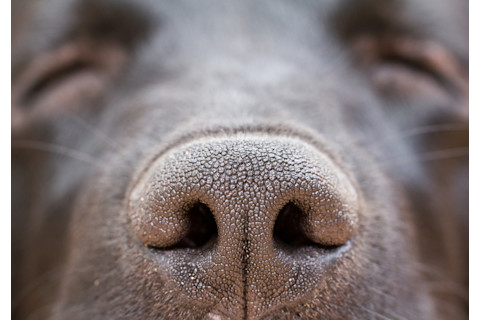
The power of dogs’ noses is well documented, and that reputation continues to improve. Researchers have discovered that our canine companions’ snouts may be more accurate than advanced laboratory procedures when it comes to detecting certain forms of cancer. Researchers at the Istituto Clinico Humanitas in Italy have trained two dogs that can sniff out the scent of prostate cancer in urine samples with a success rate of 98 percent, a new study reports. The pool of over 600 subjects makes this the largest study ever conducted using cancer-sniffing dogs.
Smelling Out Cancer
Researchers used two professionally trained dogs to test their ability to detect prostate cancer from a pool 677 people. One group of participants was cancer-free; the other group ranged from individuals with low-risk tumors to those whose cancer had metastasized to other tissues. The two dogs sniffed urine samples, and identified signs of prostate cancer with a combined 98 percent accuracy. In a few cases, the dogs identified cancer when it wasn’t there — called a false positive — accounting for the remaining 2 percent of cases. That success rate represents a vast improvement over the standard Prostate-Specific Antigen test, which has a false positive rate as high as 80 percent, Bloomberg reports
. The results were presented Saturday at the American Urological Association in Boston.
Cancer’s Scent
Dogs' noses have four times the number of olfactory cells as humans, making them sensitive enough to detect the volatile organic compounds emitted from tumors. Several smaller-scale studies have demonstrated dogs’ diagnostic abilities. Dogs have successfully sniffed out lung tumors
, melanoma
and ovarian cancer.
However, despite these findings, using dogs at the doctor's office has drawn skepticism — mostly regarding the logistics of using dogs in a clinical setting. Questions still remain about the type of dog that’s ideal for testing, how to systematize canine testing, and the financial feasibility of using dogs, Bloomberg reports.
Next Steps
A nonprofit called the InSitu Foundation
hopes put the dogs' potentially life-saving noses to work immediately, and they are looking to gain FDA approval for a canine medical scent detection kit that uses breath samples to detect lung cancer. The foundation is also funding new studies exploring canine detection of early-stage stomach and pancreatic cancers, which both lack screening methods. Other researchers are focused on identifying the biological mechanisms dogs use to sense cancer. Using this information, researchers could build robotic sniffers that mimic dogs' disease-sensing power.
Photo credit: benokky1972/Shutterstock













